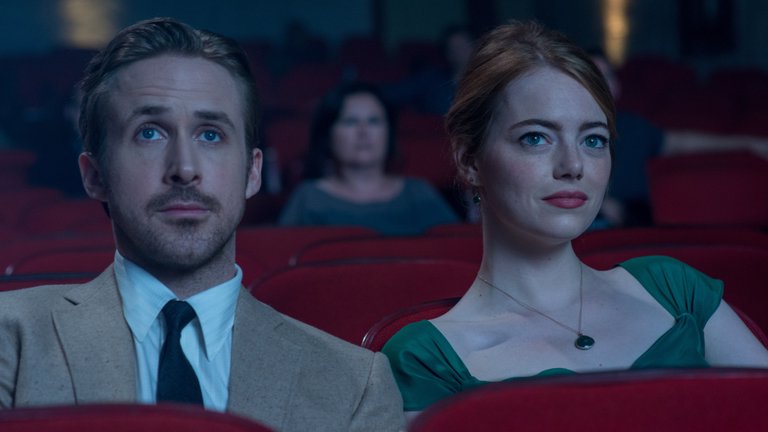Film Review: La La Land (2016)

Those who do not like jazz often say that it is music that brings more enjoyment to those playing it than to those listening it. Sometimes it is hard to shake the impression that the same could be said about films aimed at winning Oscars and other prestigious awards – they almost always bring more joy to the artists who make them than to the audiences who watch them. This can even happen with films that achieve success in their Oscar-winning ambitions. One such example is La La Land, a romantic musical directed by Damien Chazelle in 2016, which, whether by coincidence or not, has jazz music as one of its central themes.
La La Land in the title is a term used to describe Los Angeles, or more precisely, its entertainment industry and its members, whose dreams, worldviews, and life priorities often have very little connection to real life. One of them is Sebastian Wilder (played by Ryan Gosling), a jazz pianist obsessed with the purity of musical style who struggles to accept that his beloved music is being "spiced up" with more modern and commercial elements. His dream is to one day own a club where he can play the true, unadulterated, and authentic jazz. Mia Dolan (played by Emma Stone) is a former student who decides to head to Los Angeles to start an acting career but finds herself waiting tables after six years of countless auditions. Mia and Sebastian meet by chance several times, but it takes time for them to realise their mutual attraction and begin a romantic relationship. In doing so, they become each other's inspiration and help each other make decisions that could change their career trajectories. Mia decides, at Sebastian's suggestion, to write and stage a one-woman show, while Sebastian agrees to join a jazz fusion band at Mia's urging and gradually gains money and fame. However, Mia is less successful, which eventually creates an insurmountable gap between the two.
La La Land did not succeed in its aim to win the Oscar for Best Picture, but Damien Chazelle could console himself with the Oscar for Best Director, as well as five others, including those he likely cared about most – for Best Music and Best Song. Following such prestigious awards came very good box office results and critical acclaim that declared Chazelle's film an unquestionable masterpiece. As with many "Oscar" triumphs, after some time many of them begin to seem overly hyped, revealing flaws that were previously overlooked; La La Land is not without its shortcomings. Some of these can be easily concealed by Chazelle's talent in choosing Los Angeles locations, directing several quite appealing musical and dance numbers, or the excellent performances of Gosling and Stone. However, some problems are impossible to hide, especially those of a conceptual nature.
Chazelle, who shares a deep love for jazz with his protagonist, envisioned his film as a sort of homage to classic Hollywood musicals of the 1940s and 1950s. However, on the other hand, he set the plot and characters in the 2010s, attempting to provide a somewhat realistic and convincing story; yet this means La La Land will always be overshadowed by the conflict between dreams and reality, creating an impression of a film whose characters and narrative would feel much more at home in different temporal-spatial coordinates. A significant problem lies in the poorly constructed character of Mia, who behaves throughout the film like a spoiled, passive-aggressive creature that is destructive towards Sebastian but for whom the script demands sympathy from the audience. Stone, who would win an Oscar for her role, did her best but could not resolve this issue. Although Gosling made an effort to learn how to play piano for this film, his lack of musical talent is quite evident in scenes where he is required to sing. Chazelle also struggles with pacing; thus La La Land feels rather drawn out, particularly highlighted in its bittersweet finale partially inspired by the French musical The Umbrellas of Cherbourg.
However, La La Land mostly falters due to missed opportunities. Chazelle, who worked tirelessly to make his debut Whiplash, likely envisioned this film as a sort of reckoning with Hollywood and all its negatives. The script contains some fairly subversive elements, such as Sebastian's assertion that "Los Angeles loves everything but values nothing." However, Chazelle lacked the courage to push these ideas through to their conclusion, succumbing instead to pressure to create a spectacularly appealing fairy tale about the American dream factory and depicting a world that can increasingly be questioned as to whether it ever truly existed.
RATING: 4/10 (+)
Blog in Croatian https://draxblog.com
Blog in English https://draxreview.wordpress.com/
InLeo blog https://inleo.io/@drax.leo
Hiveonboard: https://hiveonboard.com?ref=drax
InLeo: https://inleo.io/signup?referral=drax.leo
Rising Star game: https://www.risingstargame.com?referrer=drax
1Inch: https://1inch.exchange/#/r/0x83823d8CCB74F828148258BB4457642124b1328e
BTC donations: 1EWxiMiP6iiG9rger3NuUSd6HByaxQWafG
ETH donations: 0xB305F144323b99e6f8b1d66f5D7DE78B498C32A7
BCH donations: qpvxw0jax79lhmvlgcldkzpqanf03r9cjv8y6gtmk9